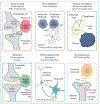Therapeutic avenues for cancer neuroscience: translational frontiers and clinical opportunities
- PMID: 35114133
- PMCID: PMC9516432
- DOI: 10.1016/S1470-2045(21)00596-9
Therapeutic avenues for cancer neuroscience: translational frontiers and clinical opportunities
Abstract
With increasing attention on the essential roles of the tumour microenvironment in recent years, the nervous system has emerged as a novel and crucial facilitator of cancer growth. In this Review, we describe the foundational, translational, and clinical advances illustrating how nerves contribute to tumour proliferation, stress adaptation, immunomodulation, metastasis, electrical hyperactivity and seizures, and neuropathic pain. Collectively, this expanding knowledge base reveals multiple therapeutic avenues for cancer neuroscience that warrant further exploration in clinical studies. We discuss the available clinical data, including ongoing trials investigating novel agents targeting the tumour-nerve axis, and the therapeutic potential for repurposing existing neuroactive drugs as an anti-cancer approach, particularly in combination with established treatment regimens. Lastly, we discuss the clinical challenges of these treatment strategies and highlight unanswered questions and future directions in the burgeoning field of cancer neuroscience.
Copyright © 2022 Elsevier Ltd. All rights reserved.
Conflict of interest statement
Declaration of interests MM-K reports personal fees from H3 Biomedicine and AstraZeneca; grants from Novartis; and royalties from Elsevier, outside the submitted work. TSH reports personal fees from Synthetic Biologics, Novocure, and Merck; equity in PanTher Therapeutics; and grants from Taiho, AstraZeneca, Bristol Myers Squibb, Tesaro, Ipsen, and Puma, outside the submitted work. AJA reports personal fees from Merck, Arrakis Therapeutics, and Oncorus; grants from Mirati Therapeutics, Deerfield, Novo Ventures, National Cancer Institute, Lustgarten Foundation, Pancreatic Cancer Action Network, Doris Duke Charitable Foundation, and Dana-Farber Cancer Institute Hale Center for Pancreatic Cancer Research; and grants and personal fees from Syros Pharmaceuticals, outside the submitted work. TJ reports grants from Lustgarten Foundation; stock in Amgen and Thermo Fisher Scientific; and membership of the Board of Directors of Amgen and Thermo Fisher Scientific, outside the submitted work. LZ reports grants from Merck, during the conduct of the study; and grants from iTeos, Bristol Meyers Squibb, Merck, AstraZeneca, Amgen, NovaRock, Inxmed, and Halozyme; personal fees from Biosion, NovaRock, Akrevia/ Xilio, Datarevive, QED, Natera, Ambrx, Snow Lake Capital, and Tempus; personal fees from Alphamab and Mingruizhiyao; and shares in Alphamab and Mingruizhiyao, outside the submitted work. PYW reports research support from Agios, AstraZeneca/Medimmune, Beigene, Celgene, Eli Lily, Genentech/Roche, Kazia, MediciNova, Merck, Novartis, Nuvation Bio, Oncoceutics, Vascular Biogenics, and VBI Vaccines; and membership on the advisory board of Agios, AstraZeneca, Bayer, Boston Pharmaceuticals, CNS Pharmaceuticals, Elevate Bio Immunomic Therapeutics, Imvax, Karyopharm, Merck, Novartis, Nuvation Bio, Vascular Biogenics, VBI Vaccines, and Voyager, outside the submitted work. All other authors declare no competing interests.
Figures


References
-
- Scherer HJ. Structural development in gliomas. Am J Cancer 1938; 34: 333–51.
-
- Batsakis JG. Nerves and neurotropic carcinomas. Ann Otol Rhinol Laryngol 1985; 94: 426–27. - PubMed
-
- Liebig C, Ayala G, Wilks JA, Berger DH, Albo D. Perineural invasion in cancer, a review of the literature. Cancer 2009; 115: 3379–91. - PubMed
-
- Amin MB, Greene FL, Edge SB, et al. The eighth edition AJCC cancer staging manual: continuing to build a bridge from a population-based to a more “personalized” approach to cancer staging. CA Cancer J Clin 2017; 67: 93–99. - PubMed
Publication types
MeSH terms
Substances
Grants and funding
LinkOut - more resources
Full Text Sources
Medical

